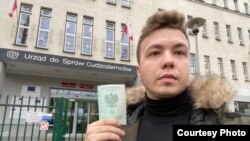On November 19, 2020, Belarusian journalist-activist Raman Pratasevich*, a former editor of the pro-Belarusian-opposition Telegram channels NEXTA and NEXTA Live, discussed with Volodymyr Mikhailov, the host of Current Time's Morning news show, the criminal charges Belarus had filed against him and NEXTA founder Stsyapan Putsila two weeks previously.
The two young men, both listed as terrorists by Belarus' Commitee of State Security, were charged on November 5, 2020 with "mass disorders," organizing and preparing activities violating public order, and inciting “social hostility.” Belarus attempted unsuccessfully to convince Poland, which had provided politcal asylum to Pratasevich and Putsila, to extradite them to Belarus to stand trial on the charges.
Pratasevich was arrested in the Belarusian capital, Minsk, on May 23, 2021, on the charges when his Ryanair flight from Athens, Greece to Vilnius, Lithuania was escorted by a Belarusian MiG fighter plane to the Minsk National Airport for a supposed bomb threat.
-Tell us, Raman, they’re demanding that you return to Belarus, considering the “special danger” of your “criminal activities.” What do you think of this wording?
-It depends on whose activity is “criminal.” For the authorities now, in theory, it seems to me, almost any expressions of dissent, one way or another, will be crimes. We can see this in the statistics about the detained, in the statistics about those who’re now in prisons, and so on … Even if for expressing their dissent, they send people to prison, then, that already says something about, probably, the largest Belarusian media outlets.
-And how did you find out that they’re demanding for you to be given up [by Poland] to Belarus?
-From the news. I woke up, opened the news, and found out that they’re now also demanding that they file a lot of criminal cases under new parts of the new article [of the criminal code]. It’s a bit unexpected, of course.
-The request’s definition of your activities as “criminal” is this complimentary to you or, on the contrary, do you find it insulting?
-Hmm, I would more likely say that it sounds like a special award from the government authorities.
-And what do you think: What’s the secret of the Telegram channel Nexta’s popularity?
-Well, actually, the issue is pretty simple. The deal is that before the start of the August events, the channel was one …. The channel was the strongest in Belarus, and, afterwards, it became, actually, for many people, one of the few … only sources of information.
-We see that the Belarusian protests don’t have a leader. Can this Telegram channel Nexta be considered the leader?
-You yourself said that there isn’t a leader. And, again, it’s doubtful that leaders, particularly on the ground, will appear. As for Telegram channels and Internet communities, I can say that all channels and all the people who work in the information field on them are a horn of the revolution, but in no way its leader.
-Do you believe a physical leader is needed for these protests?
-It’s possible. But it’s important to understand that the situation in Belarus is absolutely unique. Right now, street leaders simply can’t appear in Belarus for the simple reason that, as soon as they’ll appear, even by nightfall they’ll be testifying in a KGB temporary detention center.
-We see that protest participants have become fewer on Belarus’ streets. How do you see the outcome of these protests?
-I wouldn’t say that the number of protesters has significantly decreased. The Belarusian police needed three months to realize that protest-demonstrations should not be allowed to gather. And this is precisely what they (protesters) have started to do, after three months, and this was very much expected. At the same time, it’s worth noting that, let’s say, people again in the regions have started to take to the streets, and pretty much en masse.
It seems to me that, for now, it’s early to talk about the protests fading away somehow or about their concrete radicalization. The Belarusian protest hasn’t gone anywhere. As before, the people’s demands are monolithic, and they won’t change. Therefore, it seems to me, little has changed, even despite all the security forces’ efforts. And you can see perfectly well from [Alyaksandr] Lukashenka’s statements that this still makes him very uncomfortable, including in the area of his obligations to [Russian President] Vladimir Putin to change the constitution.
*Raman Pratasevich was a 2017-2018 Vaclav Havel Journalism fellow at Radio Free Europe/Radio Liberty, of which Current Time is part.
















